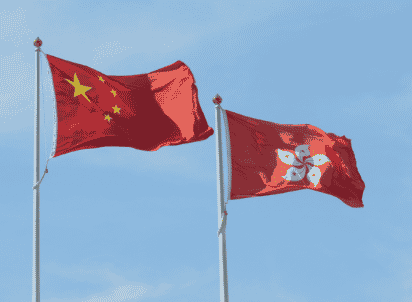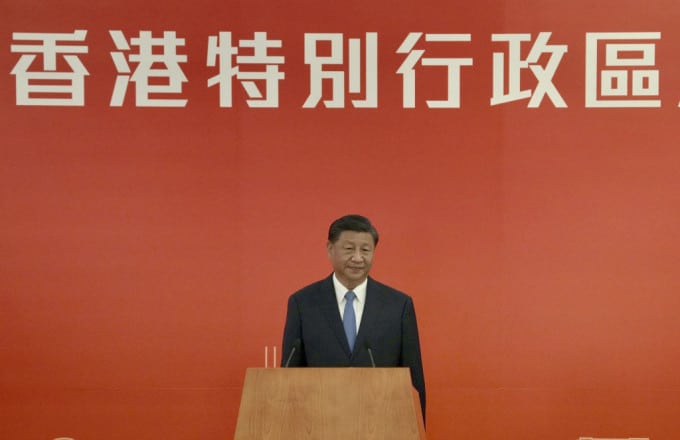To ensure that "one country, two systems" can be implemented stably and long-term, we must review Hong Kong's achievements and shortcomings since its return to the motherland. In order to provide the government and the public with a reliable reference, Democratic Thinking compiled the "One Country, Two Systems" index on the 20th anniversary of Hong Kong's return to the motherland. It commissioned the Institute of Asia-Pacific Studies at the Chinese University to conduct a telephone survey and referred to the freedom and democracy index compiled by international organizations to comprehensively analyze the opinions of Hong Kong citizens and international organizations. From two perspectives, we try to comprehensively evaluate the implementation of "one country, two systems" (see http://pathofdemocracy.hk/one-country-two-systems-index/ for a detailed report).
Since the handover, three well-known organizations in Hong Kong have conducted follow-up polls to investigate citizens' evaluation of "one country, two systems". The earliest survey conducted by the Public Opinion Research Program of the University of Hong Kong started in 1993 and found that the net value of citizens' confidence in "one country, two systems" has changed significantly over the past 24 years. The historical low of the net value was -11.5% in early 1994, and the historical high was 56% at the end of 2007. Afterwards, it dropped to -10% during the occupation period in 2014, and then rebounded slightly to 7.5 % in mid-2017.
RTHK's "Clang Collection" has commissioned the Asia-Pacific Institute of CUHK to conduct an annual survey since 2002. It was found that since 2013, the number of citizens who believe and do not believe that the central government has implemented "one country, two systems" has both remained at 20% to 30%, reflecting the public's attitude. There is skepticism, and the results are similar to those of the Hong Kong University Minyan. The Communication and Public Opinion Research Center of CUHK has conducted surveys every six months since the end of 2014, asking citizens how satisfied they are with the central government's implementation of "one country, two systems". With a perfect score of 10, the score rose slightly from 4.99 at the end of 2014 to 5.17 in 2017, on the edge of satisfaction and dissatisfaction, hovering in the middle level like the above-mentioned poll.
Be wary of low opinion poll scores
Compared with previous polls, the "One Country, Two Systems" index compiled with democratic thinking has brought breakthroughs in three aspects:
1. Introduce the freedom and democracy index compiled by international organizations. The index is compiled according to objective standards and has the same important reference value as the personal subjective feelings of Hong Kong citizens. The two can complement each other;
2. The poll is specially designed to evaluate "one country, two systems". The questionnaire covers the 10 core elements of "one country, two systems", including a high degree of autonomy, judicial independence, legislative independence, etc., and is a relatively comprehensive survey;
3. Experiment with 3 different statistical techniques and use scientific methods to compile 10 core elements into a comprehensive score.
The poll section asked citizens for their evaluation of 10 core elements of "one country, two systems", with 10 being a perfect score. The three highest-scoring items were freedom of speech (6.36), judicial independence (5.72), and legislative independence (5.53). The three lowest-scoring items were, in order, resolving conflicts between the two places through dialogue and negotiation (4.04), and internal affairs were not subject to interference. Mainland intervention (4.40) and full implementation of "one country, two systems" by 2047 (4.44). There is not much difference in the ratings of the 10 items (the lowest is 4.04 and the highest is 6.36). I believe this is because citizens have a general evaluation of "one country, two systems" in their minds. No matter what item the interviewer asks, citizens' answers are affected by the overall impression.
After surveying citizens on their ratings of 10 core elements, we used different statistical methods to compile the index, including simple average, principal component analysis and factor analysis.
Simple average is the most commonly used index compilation method. The advantage is that it is simple and easy to understand. The disadvantage is that it assumes that all elements are equally important (that is, all elements have equal weight); principal component analysis simplifies the internal structure of the data to obtain the main features of the data. components and their weights; factor analysis finds hidden and representative factors among multiple variables and extracts variables that are essentially the same.
The latter two methods are more accurate, but the calculations are complicated and obscure. Comparing the three statistical methods, we found that the results were very close. Therefore, we chose the most common and commonly used method, that is, simple average, and calculated the average score of the 10 core elements to be 4.84. The public did not rate "one country, two systems" highly. The result Similar to other polls. The low score in the polls shows that those in power must be vigilant.
Freedom and democracy are important parts of "one country, two systems", so we use two commonly used international rankings, namely the "Human Freedom Index" published by the Cato Institute in the United States and the Fraser Institute in Canada, and the "Human Freedom Index" published by the Economic "Democracy Index" published by Scholars Think Tank. The "Human Freedom Index" is further subdivided into the "Economic Freedom Index" and the "Personal Freedom Index". The "Democracy Index" measures the degree of democracy in global political systems. We then selected developed countries and regions adjacent to Hong Kong, including Japan, South Korea, and Singapore. , Taiwan are compared to evaluate Hong Kong’s performance [Table 1, Table 2].
Excellent performance in international rankings
Hong Kong's "Human Freedom Index" ranks first in the world, with excellent performance in both economic freedom and personal freedom. Hong Kong has always been hailed as the freest economy in the world. Although the "Economic Freedom Index" has dropped slightly in recent years, it still ranks first in the world. Surprisingly, Hong Kong also performs well in the "Personal Freedom Index". Its score has gradually improved in recent years, ranking 19th in the world, better than neighboring developed countries and regions.
"Personal freedom" includes seven sub-items covering universal values, including human rights, rule of law, freedom of speech, freedom of association and assembly. In these sub-items, Hong Kong's rule of law is slightly behind Singapore, but ahead of South Korea, Japan and Taiwan.
The score for freedom of speech is not low, but not outstanding. It is not as good as Japan and Taiwan, but better than South Korea and Singapore. In terms of freedom of association and assembly, Hong Kong ranks first. Hong Kong's outstanding performance in the "Personal Freedom Index" shows that Hong Kong can maintain its core values under "one country, two systems".
Japan and the "Four Asian Tigers", including Hong Kong, were all rated as "partially democratic" (6 to 7.9 points) in the 2016 "Democracy Index". Hong Kong scored 6.42 points, which is not as good as Japan, Taiwan and South Korea, but higher than Singapore [Table 1]. Since Hong Kong has not implemented universal suffrage for the chief executive, the poor performance in the "Democracy Index" is not surprising. However, Hong Kong's democracy has developed to a certain extent in the past 10 years, with its ranking rising from 84th in 2008 to 68th in 2016 [Table 2].
Due to the lag in data collection by international organizations, the 2014 international rankings are the most recent and complete data available. We will use this to compile the 2017 "Liberal Democracy Index." Hong Kong's "Liberal Democracy Index" is the average of the "Economic Freedom Index", "Personal Freedom Index" and "Democracy Index", with a score of 8.19, which is a good performance. Although international data lags behind, records from 2008 to 2014 show that international think tanks’ ratings of Hong Kong have not changed much [Table 2], so the impact of the time lag is believed to be minimal.
Compilation of the "One Country, Two Systems Index"
An overview of the world in the international index shows that Hong Kong is among the highly developed regions, and its socio-economic development is a certain level ahead of many developing countries and regions. Therefore, it is expected that its overall score in the international index is relatively high. The average score given by citizens in the polls is generally low. This may be because Hong Kong already had a mature legal foundation and protection of personal freedoms before the handover, and the political system was gradually democratized. Therefore, citizens have higher standards for "one country, two systems" in their minds. Therefore, a relatively strict score is given.
Although there is a certain gap between the poll scores and the international index, both scores for Hong Kong's rule of law and freedom of speech are relatively high, while their scores for democratic development are lower, confirming that there is indeed something worthy of recognition and need in the 20 years since the return to China. Issues to be addressed.
Therefore, to evaluate the overall situation of "one country, two systems", we must not only look at citizens' subjective evaluations, but also refer to relatively objective international indices. The "One Country, Two Systems" index of democratic thinking is the average of the liberal democracy index (8.19) and the poll score (4.84) (that is, assuming the two are equally weighted). As a result, the "One Country, Two Systems" index score in 2017 was 6.52.
This is an initial attempt to comprehensively measure the success of "One Country, Two Systems". We will further improve the methods of data collection and index compilation, and conduct polls every six months to compile the "One Country, Two Systems" index for reference by society and policymakers. We hope to encourage all stakeholders Participants, including the central government, the SAR government and civil society, actively engage in dialogue on the pros and cons of "one country, two systems" to ensure that "one country, two systems" can be implemented stably and long-term.
Song Enrong is a director of Democratic Thoughts and a visiting professor of the Department of Economics at the Chinese University of Hong Kong; Pan Xuezhi is a research assistant at the Shanghai-Hong Kong Development Joint Research Institute of the Chinese University of Hong Kong.



